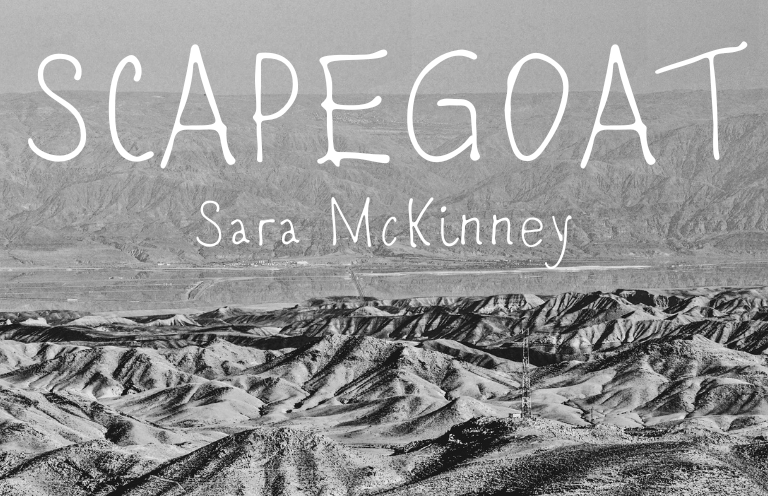In Sara McKinney’s “Scapegoat,” the narrator, “so young and so alive,” is on the brink of being conscripted into the Israeli army. This story brims with the tension of stay versus go, of duty versus honor, of the past versus the future. It’s sharp, timely, and devastating.

And in the desert, we raise our rifles skyward. Avi and I, having drunk the better part of a bottle of arak, our breath licorice and hot on the wind. It is the last night before the front, before the war we don’t believe in, and we are so young and so alive we almost can’t stand it.
Centuries ago, on Yom Kippur, the Day of Atonement, our ancestors would bring two goats into the Temple, one for the Lord and one for Azazel. The goat for the Lord they’d sacrifice at the altar. But, as for the other, they’d lead it out into the wilderness, load our sins upon its back, and let it go.
I’m going to run, I want to say, not looking at Avi, but out over the scrub of rocks and olives. I can feel the straps of my pack chafe against the tops of my shoulders, heavy with water and extra rations. I can feel the horns beginning to sprout from my hairline.
Instead, I turn back and ask him for another cigarette. Avi hands me one, grinning in that lopsided fashion that says he’s eager to break a rule or two. The same grin he’d wear whenever we’d cut class or shoplift.
How different from all those nights we stayed up late, talking about how we wouldn’t show up for service. How we’d take the family members who wouldn’t speak to us, the friends who would abandon us, the jail sentence. Minimal prospects for employment; a foreclosed future. Anything but support this occupation, this war, this government. But Avi never could keep that sort of secret.
After our parents found out, my father was the one who drove us to the duty station. Pounding his remaining fist, the one not sacrificed in Lebanon, against the steering wheel, his voice so loud, drivers in nearby cars stared: You want to turn your back on your own people? I served, your mother served, your grandparents, your uncles, your brother—may his memory be for a blessing. Where you got this idea about being a refusenik, I don’t know, but it’s not from me.
He paused, changed lanes, his molars grinding the way they always did before he said the sort of thing you can’t take back.
If you go into Gaza and still want to desert, don’t bother coming back.
What, I growled, the way Omer didn’t?
In the avodah, the second goat is driven into the mountains outside Jerusalem and pushed from the precipice. Witness: my brother, at twenty, laying in his flag-wrapped coffin, the blue and white the stripes of a tallit without fringes, victim to friendly fire in an illegal settlement. How, during the service, I kept hearing Kol Nidre: S’lach nah la’avone ha’am hazeh.
By the time the car stopped, my father and I were no longer speaking to each other.
The wind whips up again, blowing dust into the smolder of our campfire. Cigarette smoke sears the insides of my nostrils.
My sister has friends in Munich. If I can make it to Tel Aviv by tomorrow evening, I can catch a plane bound for Germany, make my way from there.
I steady the rifle against my shoulder. In the morning, I will leave behind: a cot, a foot locker, three uniforms, two novels, a bag of chocolates my cousin sent from America. My friends, my parents, my country. But I will not be a casualty or a killer.
We pull our triggers and fire until the ground is littered with casings, and overhead there are stars, I know, but all I can see are human faces bound by the red thread of tracers, all of their mouths open and screaming.
 Sara McKinney holds an MFA in Creative Writing from the University of Arizona and is the current Managing Editor at The Milton Review. Her fiction has been nominated for the Pushcart Prize and was awarded first place in Uncharted Magazine’s Novel Excerpt Contest. Her writing appears in BOOTH, Fractured Lit, Uncharted Magazine, and elsewhere. She is currently at work on her first novel.
Sara McKinney holds an MFA in Creative Writing from the University of Arizona and is the current Managing Editor at The Milton Review. Her fiction has been nominated for the Pushcart Prize and was awarded first place in Uncharted Magazine’s Novel Excerpt Contest. Her writing appears in BOOTH, Fractured Lit, Uncharted Magazine, and elsewhere. She is currently at work on her first novel.
